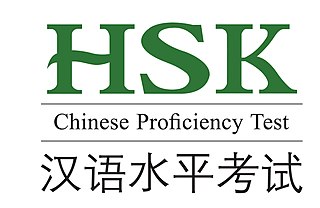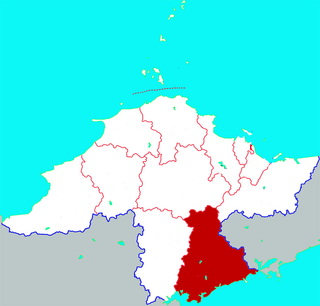Related Research Articles

Standard Chinese is a modern standard form of Mandarin Chinese that was first codified during the republican era (1912‒1949). It is designated as the official language of mainland China and a major language in the United Nations,Singapore,and Taiwan. It is largely based on the Beijing dialect. Standard Chinese is a pluricentric language with local standards in mainland China,Taiwan and Singapore that mainly differ in their lexicon. Hong Kong written Chinese,used for formal written communication in Hong Kong and Macau,is a form of Standard Chinese that is read aloud with the Cantonese reading of characters.

Tōshōdai-ji (唐招提寺) is a Buddhist temple of the Risshūsect in the city of Nara,in Nara Prefecture,Japan. The Classic Golden Hall,also known as the kondō,has a single story,hipped tiled roof with a seven bay wide facade. It is considered the archetype of "classical style".

The Hanyu Shuiping Kaoshi,translated as the Chinese Proficiency Test,is the People's Republic of China's standardized test of proficiency in PRC Standard Chinese for non-native speakers such as foreign students and overseas Chinese. The test is administered by Hanban,an agency of the Ministry of Education of the People's Republic of China.

Zhu Ziqing,born Zhu Zihua,was a renowned Chinese poet and essayist. Zhu studied at Peking University,and during the May Fourth Movement became one of several pioneers of modernism in China during the 1920s. Zhu was a prolific writer of both prose and poetry,but is best known for essays like "Retreating Figure",and "You. Me.". His best known work in verse is the long poem "Destruction" or Huimie.

The Nationwide Unified Examination for Admissions to General Universities and Colleges (普通高等学校招生全国统一考试),commonly abbreviated as Gaokao,is the annual national undergraduate admission exam of China,held in early June. The exam is held by provincial governments under directions from the Ministry of Education and is required for undergraduate admissions to all higher education institutions in the country. The Gaokao is taken by high school seniors at the end of their final year.

Taiwanese Mandarin,frequently referred to as Guoyu or Huayu,is the variety of Mandarin Chinese spoken in Taiwan. A large majority of the Taiwanese population is fluent in Mandarin,though many also speak a variety of Min Chinese known as Taiwanese Hokkien,which has had a significant influence on the Mandarin spoken on the island.

Ouhai District is a district of Wenzhou,Zhejiang. It is an outlying district of Wenzhou urban area.

Haiyang,is a coastal city in the Shandong province in eastern China,located on the Yellow Sea (southern) coast of the Shandong Peninsula. It is a county-level city under the administration of the prefecture-level city of Yantai.
Singaporean Mandarin is a variety of Mandarin Chinese spoken natively in Singapore. Mandarin is one of the four official languages of Singapore along with English,Malay and Tamil.

Liu Yong is a Taiwanese educator,novelist,painter,and philanthropist. He founded the Shui Yun Zhai Cultural Enterprise and has built over 40 schools in rural China.
The phonology of Standard Chinese has historically derived from the Beijing dialect of Mandarin. However,pronunciation varies widely among speakers,who may introduce elements of their local varieties. Television and radio announcers are chosen for their ability to affect a standard accent. Elements of the sound system include not only the segments—e.g. vowels and consonants—of the language,but also the tones applied to each syllable. In addition to its four main tones,Standard Chinese has a neutral tone that appears on weak syllables.
The ZHC is a test held by the Ministry of Human Resources and Social Security of the People's Republic of China to test Chinese citizens' proficiency in Mandarin Chinese.

Xiandai Hanyu Cidian,also known as A Dictionary of Current Chinese or Contemporary Chinese Dictionary,is an important one-volume dictionary of Standard Mandarin Chinese published by the Commercial Press,now into its 7th (2016) edition. It was originally edited by LüShuxiang and Ding Shengshu as a reference work on modern Standard Mandarin Chinese. Compilation started in 1958 and trial editions were issued in 1960 and 1965,with a number of copies printed in 1973 for internal circulation and comments,but due to the Cultural Revolution the final draft was not completed until the end of 1977,and the first formal edition was not published until December 1978. It was the first People's Republic of China dictionary to be arranged according to Hanyu Pinyin,the phonetic standard for Standard Mandarin Chinese,with explanatory notes in simplified Chinese. The subsequent second through seventh editions were respectively published in 1983,1996,2002,2005,2012 and 2016.
Yan Wenjing was a Chinese writer. He was born Yan Wenjin (严文锦) in Wuchang,Hubei province.
Quanguo Waiyu Shuiping Kaoshi is a series of foreign language tests administered in Mainland China for educators who did not major in foreign languages. The National Education Examinations Authority (NEEA) of China developed these tests. Performance on the WSK determines whether one is permitted to take training,studies,or additional studies within one's major in institutions outside of China.
The Public English Test System is a test developed by the National Education Examinations Authority (NEEA) of Mainland China. The PETS is the edition of the Quanguo Waiyu Shuiping Kaoshi (WSK) for the English language. It is available in five levels:PETS-1 through PETS-5. PETS testing is open to persons of all professions,ages,and academic backgrounds.

The National Education Examinations Authority is an independent non-profit institution under the Ministry of Education of China. Headquartered in Beijing,the institution is mainly responsible for major education examinations in China.
Xie Mian is a contemporary Chinese writer and literary scholar based in Beijing. His piece "People that Read are Happy People" included in his 1997 book Eternal Campus (永远的校园) and originally published in the July 19,1995 edition of the China Reader's Report (中华读书报) is one of the potential reading selections for Putonghua Proficiency Test test-takers.
The Table of Mandarin Words with Reviewed Variant Pronunciations,or Putonghua Words with Reviewed Variant Pronunciations,is a standard on Mandarin polyphonic monosemous words,i.e.,words with different pronunciations for the same meanings. The standard was announced by the Chinese (PRC) government in 1985.
References
- 1 2 "Content and format of the Test". Hong Kong Putonghua Education and Assessment Centre, University of Hong Kong. 2013. Archived from the original on 5 April 2016. Retrieved 2 April 2016.
- ↑ Liang, Sihua (2014). Language Attitudes and Identities in Multilingual China: A Linguistic Ethnography. Springer International. pp. 21–22. ISBN 978-3-319-12618-0.
- 1 2 3 4 Ho, Kwok-cheung (2012). Comparison of tasks employed in Mandarin Chinese proficiency tests for natives conducted in China and that in Hong Kong: One Country Two Systems (PDF). International Conference on Language Proficiency Testing in the Less Commonly Taught Languages. Bangkok.
- 1 2 3 4 5 6 7 8 9 10 11 12 13 14 15 16 17 18 19 20 普通话水平测试实施纲要[Putonghua Proficiency Test Guide]. Beijing: The Commercial Press. 2004. pp. 333–453. ISBN 7-100-03996-7.
- ↑ 海阳市筹建峻青文学艺术馆 今年10月有望开馆 [Haiyang city preparing to build Junqing Literature & Art Museum, to be opened to the public this October] (in Simplified Chinese). Fenghuang Shandong. Retrieved 8 December 2017.
峻青,原名孙俊卿,1922年出生于烟台海阳市郭城镇西楼子村,当代著名作家、画家。
- ↑ Zhu, Ziqing (2014). 朱自清散文. 浙江文艺出版社 [Zhejiang Arts Press]. ISBN 9787533935993.
- ↑ 电视文学艺术片《绿》在仙岩梅雨潭景区开机 [TV Literary Art Documentary 'Green' starts filming in Xianyan's Meiyutan Scenic Area] (in Simplified Chinese). Ouhai District People's Government. 3 December 2014. Archived from the original on 27 April 2018. Retrieved 27 April 2018.
1923年朱自清先生来温州执教,同年先后两次来到仙岩梅雨潭景区,被仙岩浓厚的人文气息和那醉人的女儿绿深深吸引,于是就写下了脍炙人口的美文名篇《绿》。
- 1 2 3 Zhang, Qing (2013). "Language Policy and Ideology: Greater China". In Bayley, Robert; Cameron, Richard; Lucas, Ceil (eds.). The Oxford Handbook of Sociolinguistics. Oxford University Press. pp. 563–586. doi:10.1093/oxfordhb/9780199744084.013.0028. ISBN 978-0-199-34407-9.
- ↑ "China Language Law" (PDF). LILAMA Network. Archived from the original (PDF) on 14 April 2016. Retrieved 3 April 2016.